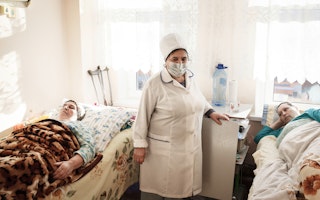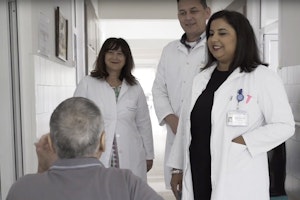Health Care Without the Pain
By Mary Callaway
As someone who has worked in palliative care for more than three decades, I am heartened by the recent surge in articles in the mainstream and medical press on the importance of providing palliative care and pain relief for patients with life-threatening illnesses. From the British Medical Journal to the New York Times, these articles highlight what many of us have been saying for years: hospice and palliative care services should be provided concurrently with disease therapy—such as chemotherapy or antiretroviral treatment for AIDS patients—and these services should be provided at every level of the health care system and at home.
A new study published this week in the New England Journal of Medicine shows that hospice and palliative care improve the quality of life of patients with life-threatening diseases such as cancer, AIDS, renal disease, or neurodegenerative disease. The media attention is long overdue but it serves to remind us how great the need is to improve the care of patients with life-threatening illnesses.
The Open Society Foundations has been working to improve the experience of death and dying since 1995. It is an issue that is very close to home: Our founder and chair George Soros has spoken very openly about his personal experience with the deaths of both of his parents. His experience led him to the conviction that no patient should suffer needlessly from untreated pain, and that patients and their families deserve emotional and social support as they are confronted with the most important event in their lives.
Our International Palliative Care Initiative works to address the needs so often stated by patients and families: their pain is unbearable; their doctors don’t know how to help them; they are not getting morphine or other pain-relieving medications; they are too sick to get to the doctor or the hospital to get the help they need. Patients know that their suffering is unnecessary but they don’t know what to do about it.
Physicians and nurses around the world are also frustrated. They tell us that they never learned how to assess or manage pain and that they don’t have access to the pain-relieving medications their patients need. They want to learn how to communicate better with their patients and their patients’ families. They want to develop programs that will help their patients, which is why they entered the medical profession to begin with. Ultimately, they want to provide palliative care services to patients in hospitals and in their homes.
To meet these needs, we are working to include palliative care courses in medical and nursing school training in Africa, South East Asia, and Eastern Europe. We are also providing palliative care training to doctors and nurses who are already working in communities. A major obstacle we face is heavy restrictions on opioid medicines like morphine. In Ukraine, for example, morphine remains out of reach for most patients. Patients who do receive pain relief are only getting a tiny fraction of the dose that is commonly prescribed in countries such as the United States.
Patients and physicians alike are stepping up to demand that pain-relieving medicines be available and affordable. Luckily, their voices are being heard and this critical issue is gaining global attention. Organizations such as the World Health Organization, the International Union Against Cancer, Human Rights Watch, and the International Narcotics Control Board have placed opioid availability near the top of their agendas. Last month in Vienna, the International AIDS Society gave palliative care a prominent spot at its conference attended by more than 20,000 scientists, health care professionals, activists, and government representatives.
The word is getting out, at long last, that patients do not need to suffer. They have a human right to pain relief, a right to receive health care from a trained medical professional, and a right to palliative care in their communities. And we are making progress to fulfill those rights. Health care professionals are being trained, more governments are beginning to make pain-relieving medicines available in their countries, hospice and palliative care services are slowly being developed—though not fast enough to meet the demand.
We know the process takes time. But for patients who are suffering with uncontrolled pain—and their families who stand by feeling helpless—the time must be now. We need more funding and political commitment for palliative care. National governments and international organizations (like the WHO, USAIDS, and the Global Fund to Fight AIDS, Tuberculosis and Malaria) must increase funding for hospice and palliative care. The science, and in turn the media, finally caught on to what we’ve long known in our hearts: palliative care works. And it can actually help people live longer and happier lives.
Until January 2015, Mary Callaway was the project director of the International Palliative Care Initiative with the Open Society Public Health Program.


